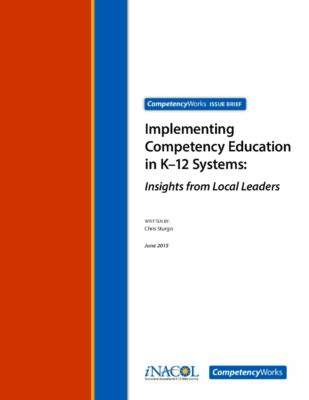Resource Hub
Explore guides, research papers, policy briefs, and tools to aid decisions on standards and assessments.
Implementing Competency Education in K-12 Systems: Insights from Local Leaders
This paper seeks to map out the terrain of the district implementation strategies being used to convert traditional systems into personalized, competency-based ones. It aspires to prepare readers to begin a transformational process. Four stages of implementation are proposed in the paper:
Ramping Up for Transformation;
Designing the Infrastructure for Learning;
Transitioning to a Competency-Based System; and
Embracing Continuous Improvement and Innovation.
The resource discusses schools and their district offices working on implementation in partnerships during transformations. The findings in the paper are based on interviews and site visits conducted over five years, as well as the knowledge shared by other leaders in the field.


This is an extensive paper focusing on the development of competency-based educational systems. It will be most useful for districts and leaders leading their systems into new practices and paradigms. It is organized by the four stages of the process of converting a district or school to competency education, emphasizing leadership strategies, community engagement, development of a culture of learning, and design decisions for creating an instruction and assessment model. The insights provided by the paper and contributing innovators offer a shared recognition of opportunities and challenges encountered in making this transition. The paper concludes, evolution to a district-wide competency-based system will not be easy, yet the strategic recommendations from cutting-edge leaders provide a basis to develop strategies to ease and accelerate the transition. While the paper does not cite direct evidence of effectiveness, the noted practices provide valuable guidelines for developing successful competency-based systems.